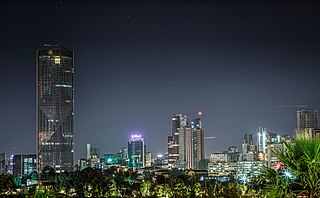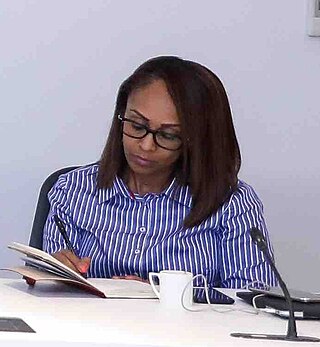Related Research Articles

Addis Ababa is the capital and largest city of Ethiopia. In the 2007 census, the city's population was estimated to be 2,739,551 inhabitants. Addis Ababa is a highly developed and important cultural, artistic, financial and administrative center of Ethiopia. It is widely known as one of Africa's major capitals.

Addis Ababa University (AAU) is a national university located in Addis Ababa, Ethiopia. It is the oldest university in Ethiopia. AAU has thirteen campuses. Twelve of these are situated in Addis Ababa, and one is located in Bishoftu, about 45 kilometres (28 mi) away. AAU has several associated research institutions including the Institute of Ethiopian Studies. The Ministry of Education admits qualified students to AAU based on their score on the Ethiopian University Entrance Examination (EUEE).

Tsegaye Gabre-Medhin was an Ethiopian poet and novelist. His novels and poems evoke retrospective narratives, fanciful epics, and nationalistic connotations. Gabre-Medhin is considered to be one of the most important Ethiopian novelists, along with Baalu Girma and Haddis Alemayehu. His books have been successful in commercial sales and in even academic theses. His works are solely based in Amharic and English.

The Coalition for Unity and Democracy, commonly referred to by its English abbreviation CUD, or occasionally CDU, was a coalition of four existing political parties of Ethiopia which combined to compete for seats in the Ethiopian General Elections held on May 15, 2005, and around the end of that year, became a full-fledged political party. Its leader was Hailu Shawul and the political party was dissolved in 2007.
Siltʼe is an Ethiopian Semitic language spoken in South Ethiopia. A member of the Afroasiatic family, its speakers are the Siltʼe, who mainly inhabit the Siltʼe Zone in the Southern Nations, Nationalities, and Peoples' Region. Speakers of the Wolane dialect mainly inhabit the Kokir Gedebano district of Gurage Zone, as well as the neighbouring Seden Sodo district of the Oromia Region. Some have also settled in urban areas in other parts of the country, especially Addis Ababa.
Sahle Sellassie Berhane Mariam is an Ethiopian novelist and translator.

Blatten Geta Heruy Welde Sellase was an Ethiopian diplomat who was Foreign Minister of Ethiopia from 1930 to 1936 and a writer in Amharic. Bahru Zewde observes that his career "stands out as the great success story ... of the early twentieth-century intellectuals," then continues, "His prolific literary record, his influence with Tafari-Hayla-Sellase and his ascent in the bureaucratic hierarchy were all characterized by an unchequered progression. Edward Ullendorff concurs in this evaluation, describing his oeuvre as "a considerable and distinguished literary output."

The languages of Ethiopia include the official languages of Ethiopia, its national and regional languages, and a large number of minority languages, as well as foreign languages.

The mass media in Ethiopia consist of radio, television and the Internet, which remain under the control of the Ethiopian government, as well as private newspapers and magazines. Ten radio broadcast stations, eight AM and two shortwave, are licensed to operate in Ethiopia. The major radio broadcasting stations include Radio Fana a private station, Radio Voice of One Free Ethiopia, and the Voice of the Revolution of Tigray. The only terrestrial (broadcast) television networks are government owned and include EBC and other regional stations. In keeping with government policy, radio broadcasts occur in a variety of languages including Amharic, Afaan Oromo, Tigrigna, and more. There are also many video sharing websites which are a popular way of getting information as well as entertainment in Ethiopia.

Le'ul Ras (Prince) Dr Asfa-Wossen Asserate is an Ethiopian-German political analyst and consultant for African and Middle-Eastern Affairs and best-selling author. A member of the Ethiopian royalty, he is the great-nephew of the last Emperor of Ethiopia Haile Selassie I, great-grandson of the Empress Menen and son of the last President of the Imperial Crown Council, Le'ul Ras (Duke) Asserate Kassa and his wife Leult (Princess) Zuriash Worq Gabre-Iqziabher.
The Siltʼe people are an ethnic group in southern Ethiopia. They inhabit the Siltʼe Zone which is part of the Southern Nations, Nationalities and Peoples Region. Silt'e people speak the Siltʼe language, a Semitic language, which is closely related to the Harari language.
The Argobba are an ethnic group inhabiting Ethiopia. A Muslim community, they are spread out through isolated village networks and towns in the north-eastern and eastern parts of the country. Group members have typically been astute traders and merchants, and have adjusted to the economic trends in their area. These factors have led to a decline in usage of the Argobba language. Argobba are considered endangered today due to exogamy and destitution as well as ethnic cleansing by the Abyssinian state over the centuries.

Getatchew Haile was an Ethiopian-American philologist widely considered the foremost scholar of the Ge'ez language and one of its most prolific. He was acknowledged for his contributions to the field with a MacArthur Fellows Program "genius" award and the Edward Ullendorff Medal from the Council of the British Academy. He was the first Ethiopian and the first African to win the award.

Dawit Kebede is an Ethiopian journalist who spent 21 months as a political prisoner after criticising his country's government in the lead up to the 2005 general election. He was released on a presidential pardon nearly two years later and sought asylum in the United States in 2011. He returned to Ethiopia in 2014. Dawit was awarded the 2010 CPJ International Press Freedom Award for his dedication to journalism.

Abe Gubegna was an Ethiopian writer. His name is sometimes spelled "Abbé" or "Abbie". He published eight novels, five plays, three collections of poetry, and translated several biographies of world leaders as well as other works. Abe mainly wrote in Amharic, but two of his books were written in English.

Bealu Girma was an Ethiopian journalist known for his criticism of prominent members of the Derg, in his book Oromay. Girma disappeared in 1984, and it is widely believed he was abducted and killed by the Derg for his critical writings. He was a notable Journalist during the time of Emperor Haile Selassie and served in various media positions in the country He has also written notable works, including Beyond the Horizon, The Bell of Conscience, The Call of the Red Star, and Haddis.
DejazmatchZewde Gebre-Sellassie was an Ethiopian nobleman, historian, and former deputy Prime Minister of Ethiopia. He was born in the village of Galdu, in the subdistrict of Mecca, to the north-west of Addis Ababa where his father was relegated.

Billene Seyoum Woldeyes is an Ethiopian politician, poet and author who is serving as the Foreign Press Secretary for the Office of Prime Minister of Ethiopia since 5 November 2018. Billene speaks as the prime minister's foreign spokesperson in English.
Tsehay Melaku is an Ethiopian writer. She has been called the first contemporary Ethiopian woman novelist, part of a wave of women writers who entered the literary scene in the early 1990s.
Daniachew Worku was an Ethiopian writer whose works include novels, plays and short stories. He wrote in both Amharic and English.
References
Gikandi, Simon. The Columbia Guide to East African literature in English since 1945, p. 169 (New York: Columbia University Press, 2007).
- ↑ "Hama Tuma – About". lyrikline.org . Retrieved November 22, 2022.